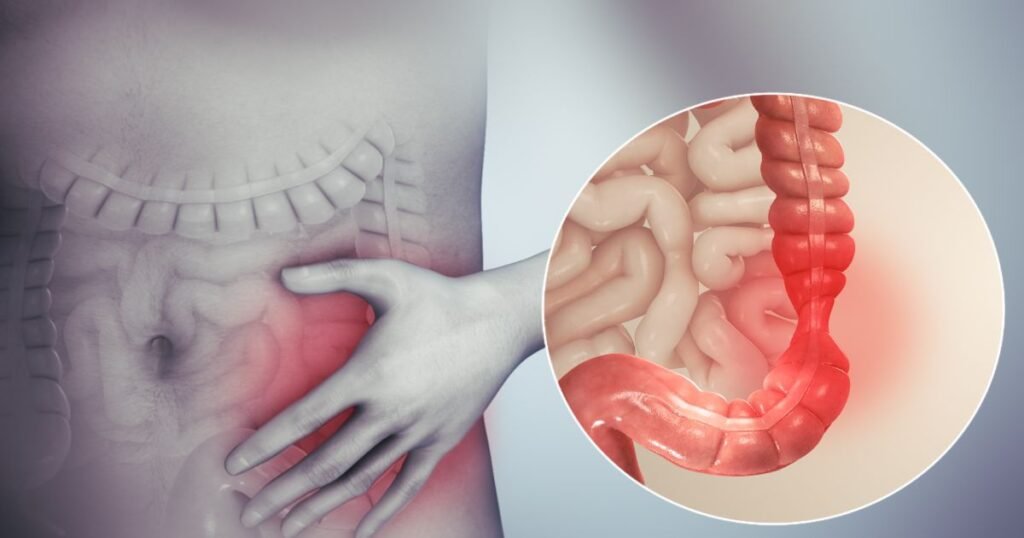Overview
Irritable bowel syndrome (IBS) is a chronic gastrointestinal disorder that affects the large intestine, causing symptoms such as abdominal pain, bloating, diarrhea, and constipation.
While IBS is not life-threatening, it can significantly impact a person’s quality of life, leading to discomfort, frustration, and challenges in managing day-to-day activities.
It is important to understand that IBS is a functional gastrointestinal disorder, meaning that the digestive system appears normal but does not work as it should.
In this blog, we will explore what irritable bowel syndrome is, its symptoms, causes, risk factors, complications, diagnosis, treatment, and prevention strategies.
Table of Contents
What is Irritable Bowel Syndrome?

Irritable bowel syndrome (IBS) is a gastrointestinal disorder that affects the way the bowel (also called intestine) works.
IBS affects the muscles in the bowel that control the movement of food through the intestines, leading to irregular bowel habits.
While the exact cause of IBS is unknown, it is believed to involve a combination of abnormal gut motility, heightened sensitivity to intestinal gas or food, and imbalances in gut bacteria.
IBS is a long-term condition, but its symptoms can be managed effectively through lifestyle changes, diet, and medical treatments.
Types of Irritable Bowel Syndrome
It is categorized into three types based on the predominant symptoms:
1. IBS with constipation (IBS-C)
2. IBS with diarrhea (IBS-D)
3. IBS with mixed bowel habits (IBS-M), where patients experience both diarrhea and constipation alternatively.
Symptoms of Irritable Bowel Syndrome
IBS symptoms can vary from person to person, but the following are common signs:
Gastrointestinal Symptoms:
- Abdominal pain or cramping: Pain in the lower abdomen is a hallmark symptom of IBS, often relieved by passing stool or gas.
- Bloating and gas: Excess gas and a feeling of fullness or distension in the abdomen are common in IBS patients.
- Diarrhea: Some individuals experience frequent loose or watery stools, especially after eating.
- Constipation: Difficulty passing stools or infrequent bowel movements is another common symptom.
- Alternating bowel habits: Some people with IBS experience both diarrhea and constipation at different times.
Non-Gastrointestinal Symptoms:
- Fatigue: IBS sufferers often experience fatigue, possibly due to poor sleep quality and the discomfort associated with the condition.
- Anxiety and depression: Emotional stress can worsen IBS symptoms, and many people with IBS report feelings of anxiety or depression.
- Mucus in stool: Some individuals may notice mucus in their stool, a symptom that is less common but can occur in IBS.
It is important to note that symptoms of IBS can fluctuate, with periods of flare-ups and remission. Stress, certain foods, and hormonal changes can trigger or worsen symptoms.
Causes of Irritable Bowel Syndrome
The exact cause of IBS remains unclear, but researchers believe it results from a combination of several factors:
- Abnormal intestinal muscle contractions: Stronger and longer-lasting contractions can cause bloating, gas, and diarrhea, while weaker contractions may lead to constipation.
- Nervous system dysregulation: Poorly coordinated signals between the brain and the gut can cause the body to overreact to changes in the digestive process, resulting in pain or discomfort.
- Gut-brain interaction: IBS is often linked to issues in the gut-brain axis, the communication pathway between the gut and the brain, which can influence bowel function.
- Inflammation in the intestines: Some people with IBS may have a mild level of inflammation in their intestines, leading to pain and discomfort.
- Infection: IBS can develop after a severe gastrointestinal infection (gastroenteritis) caused by bacteria or viruses.
- Changes in gut bacteria: Changes in the composition of gut bacteria (microbiome) have been linked to IBS, with certain imbalances potentially leading to digestive disturbances.
Risk Factors for Irritable Bowel Syndrome
While the exact cause of IBS is unknown, certain factors may increase the risk of developing the condition:
- Age: IBS typically begins in people under 50 years old, although it can affect individuals of any age.
- Gender: Women are more likely to develop IBS than men, potentially due to hormonal fluctuations, particularly during menstruation.
- Family history: If a close relative has IBS, there is an increased likelihood of developing the condition.
- Mental health issues: Stress, anxiety, and depression are associated with IBS, as the gut is highly sensitive to emotional factors.
- Gastrointestinal infection: A history of severe infections or food poisoning can trigger IBS in some individuals.
Complications of Irritable Bowel Syndrome
Although IBS does not cause permanent damage to the intestines or increase the risk of colorectal cancer, it can lead to several complications:
- Poor quality of life: The chronic nature of IBS and its symptoms can interfere with daily activities, work, and social life.
- Nutritional deficiencies: Restrictive diets or poor nutrient absorption due to diarrhea can result in deficiencies in vitamins and minerals.
- Emotional distress: The unpredictability of IBS symptoms can lead to stress, anxiety, and depression, creating a cycle of emotional and physical discomfort.
- Impact on relationships: IBS may affect personal relationships, as the need for frequent bathroom visits, dietary restrictions, and discomfort can limit social activities.
Diagnosis of Irritable Bowel Syndrome
There is no specific test for IBS, but doctors can diagnose it based on symptoms, medical history, and a physical examination. To rule out other conditions, a healthcare provider may perform the following:
- Stool test: A sample may be tested to check for infection or inflammation in the intestines.
- Blood tests: Blood tests may be conducted to rule out celiac disease or other inflammatory conditions.
- Colonoscopy: If necessary, a colonoscopy may be performed to examine the inside of the colon for signs of abnormalities.
In most cases, IBS is diagnosed using the Rome IV criteria, which specify that a person must have recurrent abdominal pain at least one day per week in the last three months, associated with changes in stool frequency or appearance.
Treatment for Irritable Bowel Syndrome
There is no cure for IBS, but treatment focuses on relieving symptoms and improving the quality of life. Treatment options include:
1. Dietary Changes:
- Low-FODMAP diet: This diet restricts certain types of carbohydrates (FODMAPs) that are poorly absorbed in the small intestine and can cause gas, bloating, and diarrhea.
- Fiber intake: For individuals with constipation-predominant IBS (IBS-C), increasing fiber intake can help regulate bowel movements.
- Avoiding trigger foods: Identify and avoid foods that exacerbate symptoms, such as fatty foods, caffeine, alcohol, and spicy foods.
2. Medications:
- Antispasmodics: These medications can help reduce muscle spasms in the intestines, alleviating pain and cramping.
- Laxatives: For IBS-C, laxatives can help relieve constipation.
- Anti-diarrheal medications: For IBS-D, medications like loperamide can help reduce diarrhea.
- Antidepressants: Low doses of antidepressants can help relieve pain and improve mood in individuals with IBS, as they affect the gut-brain axis.
- Probiotics: These can help restore the balance of gut bacteria and alleviate symptoms for some individuals.
3. Psychological Therapies:
- Cognitive-behavioral therapy (CBT): CBT can help manage the stress and anxiety associated with IBS by changing the way individuals think about and react to their symptoms.
- Stress management: Techniques such as mindfulness, relaxation exercises, and yoga can help reduce stress, which may improve IBS symptoms.
Prevention of Irritable Bowel Syndrome
While IBS cannot always be prevented, certain strategies can help reduce the frequency and severity of symptoms:
- Maintain a healthy diet: Eating a balanced diet rich in fiber and avoiding trigger foods can help manage IBS symptoms.
- Stay hydrated: Drinking plenty of water can help with digestion and prevent constipation.
- Exercise regularly: Physical activity can improve bowel function, reduce stress, and enhance overall health.
- Manage stress: Practicing relaxation techniques, such as deep breathing exercises, meditation, or yoga, can reduce stress and improve symptoms.
- Keep a food diary: Tracking your diet and identifying potential food triggers can help you avoid exacerbating IBS symptoms.
Conclusion
Irritable bowel syndrome (IBS) is a common digestive disorder that can significantly affect a person’s daily life.
While its exact cause remains unclear, understanding the symptoms, triggers, and treatment options can help individuals manage their condition effectively.
Through a combination of dietary changes, medication, stress management, and support from healthcare professionals, people with IBS can lead healthy and fulfilling lives.
If you experience persistent digestive discomfort or suspect you have IBS, it is important to seek medical advice to receive a proper diagnosis and create a personalized treatment plan.
Frequently Asked Questions (FAQs)
1. Can IBS be cured?
There is currently no cure for IBS, but its symptoms can be effectively managed through dietary changes, medication, and stress management.
2. Is IBS a serious condition?
IBS is not life-threatening and does not cause permanent damage to the intestines. However, it can significantly impact a person’s quality of life if not properly managed.
3. What foods should I avoid if I have IBS?
Common trigger foods include fatty foods, dairy products, caffeine, alcohol, and foods high in FODMAPs such as beans, garlic, and onions. However, triggers can vary from person to person.
4. How is IBS different from inflammatory bowel disease (IBD)?
IBS is a functional disorder that affects how the bowel works, while IBD, such as Crohn’s disease or ulcerative colitis, involves inflammation of the bowel and can cause permanent damage.
5. Can stress make IBS worse?
Yes, stress and anxiety can worsen IBS symptoms. Managing stress through relaxation techniques or therapy can help alleviate symptoms.

